Find Help
More Items From Ergsy search
-

BSL - Symptoms of panic disorder
Relevance: 100%
-

BSL - Diagnosis of panic disorder
Relevance: 87%
-
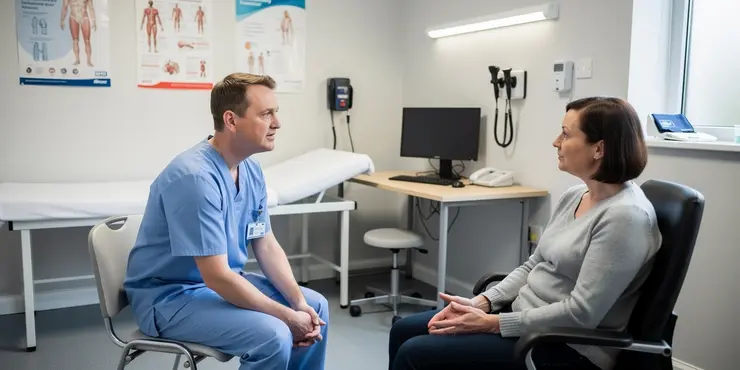
BSL - Introduction to panic disorder
Relevance: 86%
-
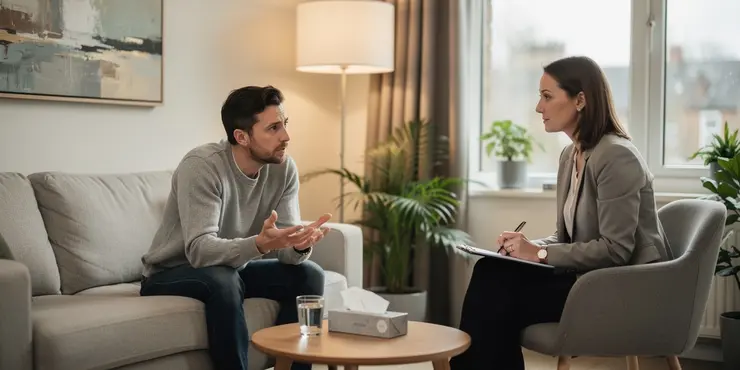
BSL - Treatment of panic disorder
Relevance: 85%
-

BSL - Causes of panic disorder
Relevance: 84%
-

BSL - Panic disorder: things you can do to help yourself
Relevance: 73%
-

BSL - How to deal with panic attacks
Relevance: 53%
-
What are common symptoms of eating disorders?
Relevance: 48%
-
What is an Eating Disorder?
Relevance: 36%
-
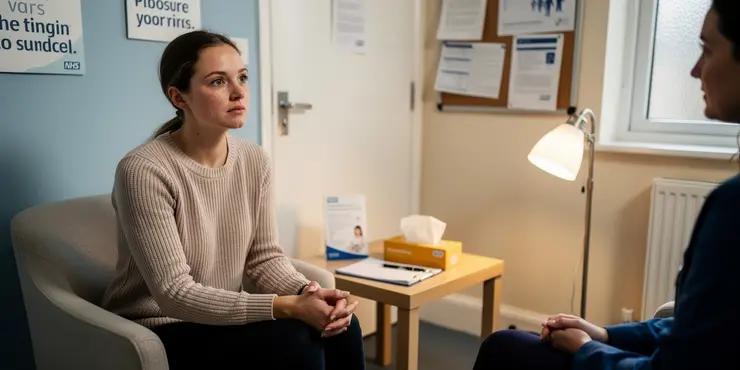
How do eating disorders affect mental health?
Relevance: 36%
-
What is an eating disorder?
Relevance: 36%
-

Living with Bipolar Disorder
Relevance: 36%
-
What are common symptoms of health-related anxiety?
Relevance: 35%
-
How are eating disorders diagnosed?
Relevance: 35%
-

Bipolar disorder: Rod's story | NHS
Relevance: 33%
-
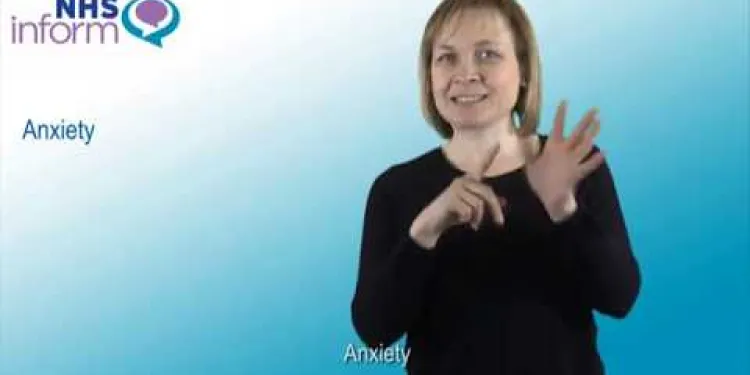
Generalised anxiety disorder (GAD)
Relevance: 33%
-
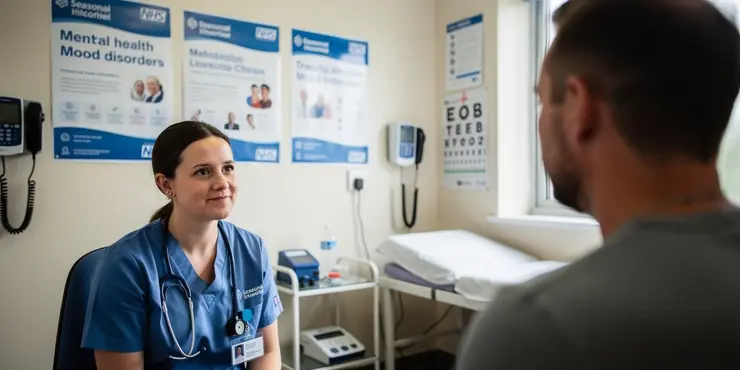
How common is Seasonal Affective Disorder?
Relevance: 33%
-

Eating disorders: treatment
Relevance: 32%
-
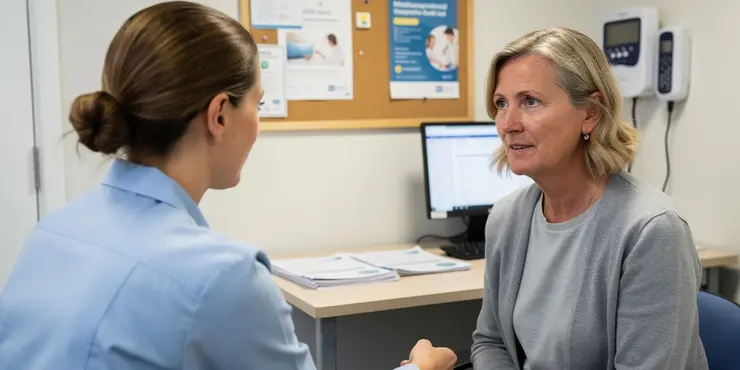
What is seasonal affective disorder - or SAD?
Relevance: 32%
-
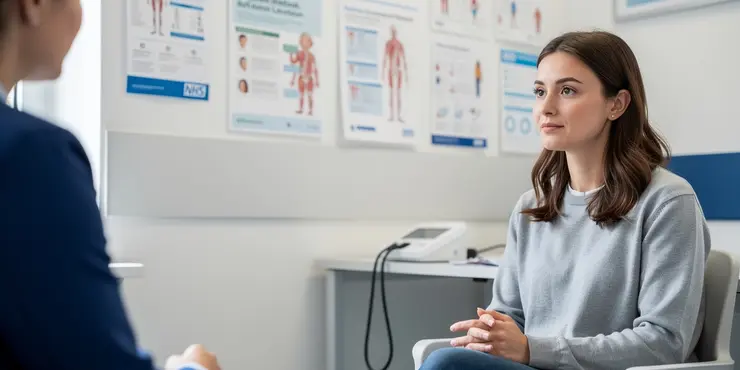
The treatment approach for an eating disorder
Relevance: 32%
-
What are the main types of eating disorders?
Relevance: 32%
-

What is Seasonal Affective Disorder (SAD)?
Relevance: 31%
-

What are the symptoms of SAD?
Relevance: 31%
-
What is body dysmorphia and how is it related to eating disorders?
Relevance: 31%
-
Can eating disorders be treated?
Relevance: 31%
-

What is Seasonal Affective Disorder? (SAD)
Relevance: 31%
-
Are there preventative measures for eating disorders?
Relevance: 31%
-
What are the early warning signs of an eating disorder?
Relevance: 30%
-
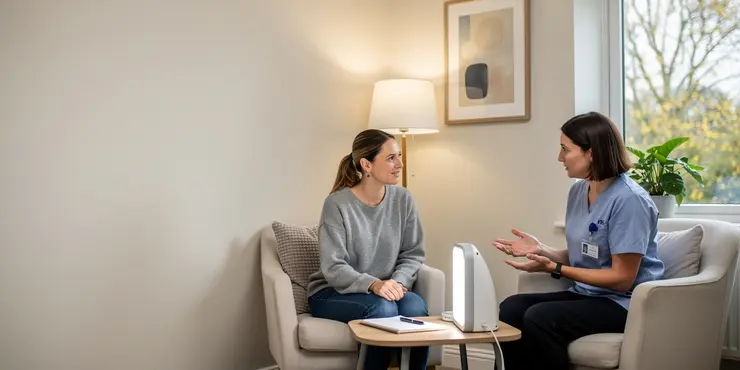
Strategies for Managing Seasonal Affective Disorder
Relevance: 30%
-

Post-traumatic stress disorder (PTSD) - Introduction
Relevance: 30%
-
What are some common myths about eating disorders?
Relevance: 30%
-
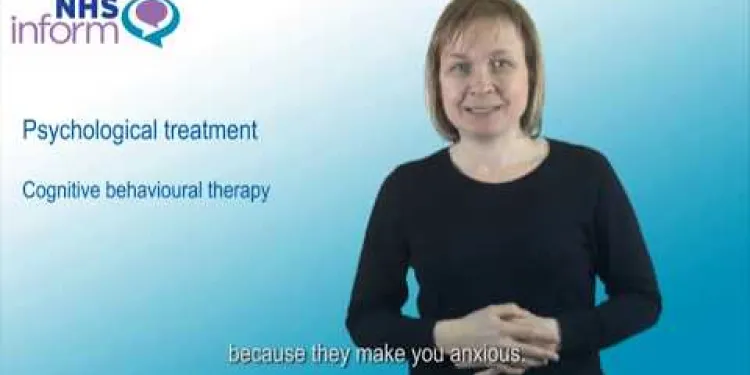
Treating generalised anxiety disorder (GAD)
Relevance: 30%
-
Can eating disorders occur with other mental health conditions?
Relevance: 30%
-
How can someone seek help for an eating disorder?
Relevance: 30%
-
Is it possible to recover from an eating disorder?
Relevance: 30%
-
Who is at risk for developing an eating disorder?
Relevance: 30%
-

What are the symptoms of postnatal depression?
Relevance: 30%
-
Are eating disorders only about food?
Relevance: 29%
-
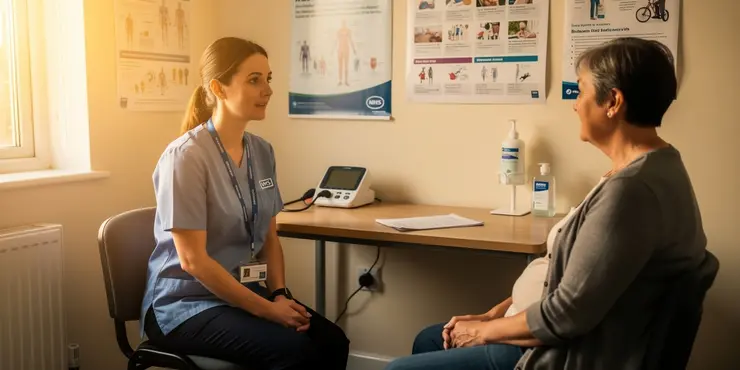
Is it possible for alcohol alone to cause similar symptoms?
Relevance: 29%
-

BSL - Diagnosis of obsessive compulsive disorder (OCD)
Relevance: 29%
Understanding the Symptoms of Panic Disorder
Physical Symptoms
Panic disorder is characterised by sudden and recurrent panic attacks. Physical symptoms of these attacks often include rapid heart rate (palpitations), sweating, trembling, shortness of breath, and chest pain. Individuals may also experience dizziness, chills, or hot flushes. These symptoms can be mistaken for medical emergencies, adding to the distress.
Emotional Symptoms
Emotionally, panic disorder can cause a sense of impending doom or danger, a fear of losing control, and a detachment from reality (depersonalisation). These intense feelings often emerge without warning and may not be related to the actual danger. The unpredictability of symptoms significantly impacts daily life.
Cognitive Symptoms
Cognitively, panic disorder sufferers often deal with intense and persistent worries about an impending panic attack. This anticipation can result in avoidance behaviour, where individuals steer clear of situations or places where previous attacks have occurred. This cycle of panic and worry can lead to further mental health challenges like depression.
Impact on Daily Life
The cumulative effect of physical, emotional, and cognitive symptoms can substantially disrupt daily life. Panic disorder may result in absenteeism from work or school, avoiding social activities, and increased reliance on medication or alcohol. Early recognition and intervention are therefore crucial to manage the disorder effectively.
Seeking Help
In the United Kingdom, several resources are available to those struggling with panic disorder. General Practitioners (GPs) are often the first point of contact and can provide access to specialised mental health services. Organisations such as Mind and Anxiety UK offer additional support, information, and counselling options. Treatment commonly involves therapy, medication, or a combination of both tailored to individual needs.
Understanding Panic Disorder Symptoms
Body Symptoms
Panic disorder means having sudden panic attacks. During an attack, your heart might beat very fast. You could sweat, shake, and find it hard to breathe. You might have chest pain or feel dizzy. You could suddenly feel cold or hot. These feelings can be very scary and may feel like a medical emergency.
Feelings
Panic disorder can make you feel like something bad is about to happen. You might feel very scared and feel like you are not in control. It can feel like things are not real. These strong feelings can come without any warning and might not match what is really happening. This can make everyday life hard.
Thoughts
People with panic disorder often worry a lot about having another panic attack. This can make them avoid going to places where they had an attack before. This can make the worrying worse, and might lead to more problems like feeling sad or depressed.
Everyday Life
Panic disorder symptoms can make everyday life hard. People might miss work or school and avoid being with friends. Some might use medicine or alcohol too much. It is important to get help early to manage these symptoms.
Getting Help
If you live in the UK, there are places to get help for panic disorder. You can talk to a doctor (GP) first. They can help you find the right support. Groups like Mind and Anxiety UK also offer help and advice. Treatment often includes talking therapy, medicine, or both, depending on what you need.
Frequently Asked Questions
What are the common symptoms of panic disorder?
Common symptoms of panic disorder include sudden episodes of intense fear, palpitations, sweating, trembling, shortness of breath, and a feeling of impending doom.
How long do panic attacks typically last?
Panic attacks usually peak within 10 minutes and last about 20 to 30 minutes, although some symptoms can linger for an hour or more.
Are panic attacks harmful?
Panic attacks are not physically harmful, but they can be very distressing and may impact daily life and mental well-being.
Can panic disorder be cured?
While there's no definitive cure for panic disorder, it can be effectively managed with therapy, medication, and lifestyle changes.
What triggers panic attacks?
Triggers for panic attacks can include stress, certain situations, caffeine, drug use, and sometimes occur without any obvious cause.
Is panic disorder the same as anxiety disorder?
Panic disorder is a type of anxiety disorder characterized by recurrent and unexpected panic attacks, but not all anxiety disorders involve panic attacks.
How is panic disorder diagnosed?
Panic disorder is diagnosed based on clinical evaluation, considering the frequency, severity of panic attacks, and their impact on daily life.
Are there effective treatments for panic disorder?
Yes, treatments such as Cognitive Behavioral Therapy (CBT), medication (SSRIs or benzodiazepines), and lifestyle modifications can be effective.
Can lifestyle changes help manage panic disorder?
Yes, regular exercise, healthy eating, adequate sleep, and avoiding caffeine and alcohol can help manage symptoms of panic disorder.
What should I do during a panic attack?
During a panic attack, try to stay calm, practice deep-breathing techniques, and remind yourself that it will pass and is not life-threatening.
Can children have panic disorder?
Yes, children and adolescents can also suffer from panic disorder, though it often presents differently and may be harder to diagnose.
Is medication always necessary for treating panic disorder?
Medication isn't always necessary; some individuals manage their symptoms well with therapy and lifestyle changes alone, but for others, medication can be a crucial part of treatment.
Can panic disorder lead to other health issues?
Yes, if left untreated, panic disorder can increase the risk of developing other anxiety disorders, depression, and may lead to substance misuse.
Is it important to avoid certain foods or drinks if I have panic disorder?
It can be helpful to limit or avoid stimulants like caffeine, as well as alcohol, which can trigger or worsen panic attack symptoms.
Can support groups help with panic disorder?
Yes, joining a support group can provide emotional comfort, reduce feelings of isolation, and offer practical advice from others who understand what you're going through.
What are the common signs of panic disorder?
Panic disorder is when people have panic attacks. Here are the common signs:
- Feeling very scared or worried suddenly
- Heart beats fast
- Hard to breathe
- Feeling dizzy or lightheaded
- Feeling hot or cold
- Tummy feels upset
- Feeling shaky
- Thinking something bad will happen
If you have these signs, talking to a doctor or counselor can help. Breathing slowly and counting to ten can also help calm you down.
People with panic disorder feel very scared sometimes, even when there is no danger. This is called a panic attack.
Here are some signs of a panic attack:
- Heart beats very fast (palpitations).
- You sweat a lot.
- Your body shakes.
- It's hard to breathe.
- You feel like something bad is going to happen.
If you have these feelings, telling someone you trust can help. Breathing slowly and counting can also make you feel better.
How long does a panic attack usually last?
A panic attack usually lasts for a short time. It often happens fast and can be over in 10 to 30 minutes. Everyone is different, and sometimes it might feel like it lasts longer.
If you have panic attacks, try to take deep breaths and stay calm. It can help to talk to someone you trust or a doctor.
Panic attacks can feel really scary, but they don't last long. They are the strongest after about 10 minutes. Most of the time, they stop after 20 to 30 minutes. Sometimes, some feelings might stay for an hour or more.
Are panic attacks harmful?
A panic attack can feel very scary. But it cannot hurt you. It's your body reacting to stress. When you have a panic attack, try these ideas:
- Take slow, deep breaths.
- Count slowly to 10.
- Think of a happy place.
- Talk to someone you trust.
If panic attacks happen a lot, tell a doctor or a caregiver. They can help you feel better. Remember, you are safe.
Panic attacks do not hurt your body, but they can be very scary. They might make it hard to do things every day and feel good in your mind.
Can we make panic disorder go away?
There is no cure for panic disorder, but you can feel better with help. Therapy, medicine, and changing your daily habits can help a lot.
What causes panic attacks?
Panic attacks can start suddenly. They make you feel very scared or worried. Here are some things that can cause them:
- Feeling stressed or worried
- Having too much caffeine, like coffee or energy drinks
- Big changes, like moving to a new school
- Thinking about something that frightens you
You can try these things to help you feel better:
- Take slow, deep breaths
- Tell someone you trust how you feel
- Use a favorite toy or object to help calm down
- Listen to relaxing music or sounds
Things that can make panic attacks happen are feeling stressed, being in certain places, drinking caffeine, using drugs, or sometimes they just happen for no clear reason.
Is panic disorder the same as anxiety disorder?
Panic disorder and anxiety disorder are not the same.
Panic disorder means having sudden, strong feelings of fear. Your heart might beat fast, or you may feel like you can't breathe. These feelings can happen anytime.
Anxiety disorder means feeling worried or scared a lot of the time. It can make you feel nervous or stressed.
Both are feelings that can be hard to deal with. It's important to talk to someone who can help, like a doctor or a counselor.
You can try deep breathing or counting to 10 slowly to feel calmer.
Panic disorder is a type of anxiety problem. It causes panic attacks that happen again and again. Not all anxiety problems have panic attacks.
How do doctors find out if someone has panic disorder?
Doctors find out if someone has panic disorder by asking questions. They look at how often and how strong the panic attacks are. They also see how the panic attacks affect the person's daily life.
Can panic attacks be treated?
Yes, there are ways to help if you have panic attacks. Here are some things that can help:
- Talking to someone: You can talk to a doctor or therapist. They can help you understand your feelings and teach you ways to feel better.
- Medicine: There are medicines that can make you feel less anxious and scared. A doctor can tell you if these might help you.
- Breathing exercises: Learning how to breathe slowly and deeply can help you feel calmer when you start to feel scared.
- Apps and tools: There are apps and tools that can help you learn to relax and manage panic attacks. These might have games or exercises to help you feel better.
These things can help you feel less scared and more in control.
Yes, there are ways to help: talking therapy called Cognitive Behavioral Therapy (CBT), medicine (like SSRIs or benzodiazepines), and changing habits can work well.
Can changing my daily habits help with panic disorder?
Yes, changing some of your daily habits can help with panic disorder. Here are some helpful things you can try:
- Exercise: Try to move your body more often. You can go for a walk, run, or play a fun sport.
- Relaxation: Take deep breaths, stretch, or listen to calming music to help you relax.
- Sleep: Make sure you get enough sleep each night to feel rested and happy.
- Healthy Eating: Eat lots of fruits, vegetables, and healthy foods to help your body feel good.
- Avoid Caffeine: Try to drink less coffee, tea, or soda, as they can make you feel more anxious.
- Talking to Someone: Talk to a friend or a family member when you feel worried. They can help you feel better.
These small changes can make a big difference. It's okay to ask for help if you need it. You can also talk to a doctor or therapist for more advice.
Yes, doing exercise, eating healthy food, getting enough sleep, and staying away from caffeine and alcohol can help if you feel very worried or scared often.
What can I do when I feel very scared?
When you have a panic attack, try to stay calm. Breathe in and out slowly. Remember, it will be over soon and it will not hurt you.
Can kids have panic disorder?
Yes, kids and teenagers can have panic disorder too. But it might look different and can be harder to spot.
Do you always need medicine for panic disorder?
Sometimes people take medicine to help with panic attacks. But not everyone needs it.
There are other ways to feel better, like:
- Talking to a therapist or counselor.
- Learning to breathe slowly and calmly.
- Doing exercises to relax your body, like yoga.
- Using apps that help you stay calm.
It's important to talk to a doctor or a grown-up to find out what's best for you.
Sometimes people do not need medicine. They can feel better with talking therapy or changing their habits. But for some people, medicine is very important to help them feel better.
Can panic disorder cause other health problems?
Yes, if you don't get help for panic disorder, it can cause more problems. You might get other anxiety disorders or feel very sad (depression). It could also make you use drugs or alcohol too much.
Should I stop eating or drinking some things if I get panic attacks?
If you have panic attacks, some foods and drinks might make them worse. Try not to have too much of these:
- Caffeine: This is in coffee, tea, and some soft drinks. It can make you feel more anxious.
- Sugar: Eating lots of sugary snacks can make you feel jittery.
- Alcohol: Drinking alcohol can affect your mood and might make panic attacks more likely.
Helpful tips:
- Use a food diary to note how different foods make you feel.
- Talk to a doctor or dietitian if you need help with eating habits.
- Try calming activities, like deep breathing or drawing, to help you relax.
It can help to drink less caffeine and alcohol. These can make panic attacks worse.
Can support groups help with panic disorder?
A support group is a group of people who meet to talk and help each other. They all have something similar. People with panic disorder can feel very scared suddenly. Support groups can help because:
- You can meet others who feel the same way.
- You can share your own story and listen to theirs.
- You can learn new ways to feel better.
- Feeling less alone can make you feel better too.
If you have panic disorder, you can try joining a support group. You can also talk to a doctor or a counselor. They can help too.
Some tools that might help:
- Deep breathing exercises to feel calmer.
- A diary to write down how you feel.
- Talking to friends or family about your feelings.
Yes, being part of a support group can help you feel better. It makes you feel less alone and gives you useful tips from people who know what you're facing.
Useful Links
This website offers general information and is not a substitute for professional advice.
Always seek guidance from qualified professionals.
If you have any medical concerns or need urgent help, contact a healthcare professional or emergency services immediately.
Some of this content was generated with AI assistance. We’ve done our best to keep it accurate, helpful, and human-friendly.
- Ergsy carfully checks the information in the videos we provide here.
- Videos shown by Youtube after a video has completed, have NOT been reviewed by ERGSY.
- To view, click the arrow in centre of video.
- Most of the videos you find here will have subtitles and/or closed captions available.
- You may need to turn these on, and choose your preferred language.
- Go to the video you'd like to watch.
- If closed captions (CC) are available, settings will be visible on the bottom right of the video player.
- To turn on Captions, click settings .
- To turn off Captions, click settings again.
More Items From Ergsy search
-

BSL - Symptoms of panic disorder
Relevance: 100%
-

BSL - Diagnosis of panic disorder
Relevance: 87%
-

BSL - Introduction to panic disorder
Relevance: 86%
-

BSL - Treatment of panic disorder
Relevance: 85%
-

BSL - Causes of panic disorder
Relevance: 84%
-

BSL - Panic disorder: things you can do to help yourself
Relevance: 73%
-

BSL - How to deal with panic attacks
Relevance: 53%
-
What are common symptoms of eating disorders?
Relevance: 48%
-
What is an Eating Disorder?
Relevance: 36%
-

How do eating disorders affect mental health?
Relevance: 36%
-
What is an eating disorder?
Relevance: 36%
-

Living with Bipolar Disorder
Relevance: 36%
-
What are common symptoms of health-related anxiety?
Relevance: 35%
-
How are eating disorders diagnosed?
Relevance: 35%
-

Bipolar disorder: Rod's story | NHS
Relevance: 33%
-

Generalised anxiety disorder (GAD)
Relevance: 33%
-

How common is Seasonal Affective Disorder?
Relevance: 33%
-

Eating disorders: treatment
Relevance: 32%
-

What is seasonal affective disorder - or SAD?
Relevance: 32%
-

The treatment approach for an eating disorder
Relevance: 32%
-
What are the main types of eating disorders?
Relevance: 32%
-

What is Seasonal Affective Disorder (SAD)?
Relevance: 31%
-

What are the symptoms of SAD?
Relevance: 31%
-
What is body dysmorphia and how is it related to eating disorders?
Relevance: 31%
-
Can eating disorders be treated?
Relevance: 31%
-

What is Seasonal Affective Disorder? (SAD)
Relevance: 31%
-
Are there preventative measures for eating disorders?
Relevance: 31%
-
What are the early warning signs of an eating disorder?
Relevance: 30%
-

Strategies for Managing Seasonal Affective Disorder
Relevance: 30%
-

Post-traumatic stress disorder (PTSD) - Introduction
Relevance: 30%
-
What are some common myths about eating disorders?
Relevance: 30%
-

Treating generalised anxiety disorder (GAD)
Relevance: 30%
-
Can eating disorders occur with other mental health conditions?
Relevance: 30%
-
How can someone seek help for an eating disorder?
Relevance: 30%
-
Is it possible to recover from an eating disorder?
Relevance: 30%
-
Who is at risk for developing an eating disorder?
Relevance: 30%
-

What are the symptoms of postnatal depression?
Relevance: 30%
-
Are eating disorders only about food?
Relevance: 29%
-

Is it possible for alcohol alone to cause similar symptoms?
Relevance: 29%
-

BSL - Diagnosis of obsessive compulsive disorder (OCD)
Relevance: 29%


